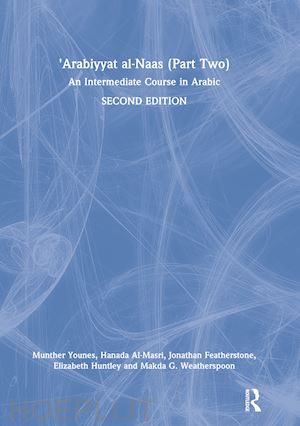Munther Younes is Reis Senior Lecturer of Arabic Language and Linguistics and Director of the Arabic Program at Cornell University. He is the co-author of the ‘Arabiyyat al-Naas textbook series and the author of the following books: The Routledge Introduction to Qur’anic Arabic, Kalila wa Dimna for Students of Arabic , The Integrated Approach to Arabic Instruction, and Charging Steeds or Maidens Doing Good Deeds: In Search of the Original Qur’an, all published by Routledge. He has also published numerous articles on Arabic linguistics, teaching Arabic as a foreign language, and the language of the Qur’an. Hanada Al-Masri is Associate Professor of Arabic in the Department of Modern Languages at Denison University, Ohio, where she teaches Arabic language and culture courses at all levels. She serves as Chair of the Department of Modern Languages and Director of the Middle East and North African studies program. Her research areas include translation theory and Arabic literary translation, discourse analysis, language attitudes, and Arabic language teaching and pedagogy. She is a certified ACTFL OPI tester since 2014. Dr. Al-Masri holds a PhD in linguistics from Purdue University (Indiana) as well as an MA in linguistics and a BA in English language and literature from the University of Jordan. Jonathan Featherstone is a great believer in the Integrated Approach. He has been teaching Arabic to non-native speakers for over 30 years. Jonathan has taught Arabic in the UK at the Foreign and Commonwealth Office, the Defence School of Languages and, more recently, at the University of Edinburgh as Senior Teaching Fellow. He is also a teacher trainer and has delivered workshops in Communicative Arabic Teaching in the UK, UAE, and US. He is also author of BBC Talk Arabic and co-author of Arabiyyat al-Naas fi Masr. Elizabeth Huntley is a current doctoral student in second language studies at Michigan State University. She holds master’s degrees in teaching Arabic as a foreign language and in Middle Eastern and North African studies from the University of Michigan. She has taught Arabic at the tertiary level at Cornell University and the University of Michigan, and at the pre-tertiary level with the Concordia Language Villages, the Middlebury-Monterey Language Academy, and the STARTALK Arabic Summer Academy of the Boston Public Schools. Makda G. Weatherspoon is Senior Lecturer of Arabic at Cornell University. She has also taught Arabic at the University of Washington and Middlebury Language Program in addition to working as a curriculum developer of online Arabic materials at the University of Cambridge Language Centre. Prior to teaching at the university level, she worked as an English instructor with refugees and immigrants preparing to take their US citizenship tests. Makda is the co-author of the following textbooks: Arabiyyat al-Naas fii Masr, Arabiyyat al-Naas (Part One) , and Arabiyyat al-Naas Part II, second edition.












